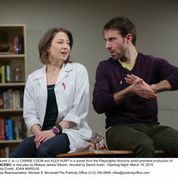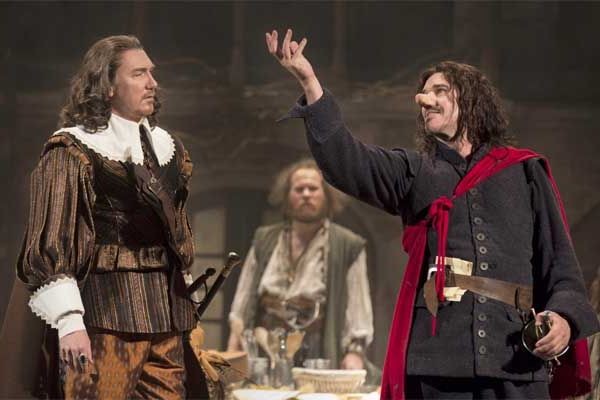by: Michael Bracken
It’s a mess – in the very best sense of the word. Melissa James Gibson’s Placebo, at Playwrights Horizons, is a mess the way life is a mess, with unclear boundaries and misplaced blame and halting communication that misses the mark as often as not.
David Zinn’s set is a case in point. At first glance it bespeaks an expansive, borderless living room room/kitchen area where clinician Louise (Carrie Coon) and her boyfriend Jonathan (William Jackson Harper) live. So it’s surprising when Mary (Florencia Lozano), one of the subjects in Louise’s female arousal study, is interviewed right next to the kitchen. It soon becomes clear, however, that without any change in scenery or props, the same playing area is Louise’s home, office, and employee break room, overlapping as necessary. The vending machine in the back corner, which you may not notice at first, is a sure giveaway. Yet, even it doesn’t seem out of place in the domestic scenes.
Daniel Aukin’s smooth direction, aided by Matt Frey’s precise lighting, make the transitions seamless. But Gibson’s writing is what connects the dots and propels the story forward. Her dialogue is to the point, devoid of extraneous words except for genuine conversational tics. Her characters – Mary, Jonathan, and Tom (Alex Hurt), a break room acquaintance of Louise – have defining traits but are all three-dimensional. And the skill with which Gibson weaves together the various threads of Louise’s unraveling existence is remarkable.
Louise, a thirty something woman and the play’s central character, is at a pivotal point in her life. Her mother’s dying; her relationship with Jonathan is on rocky ground. And she’s concerned about Mary, a study participant with a substantial emotional investment in the study. Louise fears Mary might be receiving placebos. For the most part, she takes it all in stride, although we get glimpses of her concern for both her mother‘s worsening health and her relationship’s slow demise.
We also see her playful side, as she strikes up an acquaintance with Tom. But somehow, for all her forthright honesty, she remains an enigma. We know her in a way that’s completely candid, but it’s hard to say what makes her tick. This could be a negative but Gibson uses it to advantage. Louise’s seeming lack of mystery is exactly what renders her mysterious. Our curiosity is never sated.
And Coon’s performance couldn’t be more on point. She floats through the play without a sign of effort or industry. Always on an even keel, she calls no attention to herself but her brilliantly matter-of-fact performance can’t be ignored. Her rhythms are natural; she’s even but never flat. Her Louise develops in increments that are barely noticeable.
The rest of Aukin’s cast also shines to differing degrees. Lozano displays varying shades of neurosis as Mary, and Hurt is the class clown as Tom. Harper has the hardest task, which he accomplishes with conviction but not necessarily a whole lot of fun. Admittedly irritable, he’s plagued by a dissertation, layers of self-doubt, a tobacco addiction, and a girlfriend who increasingly gets on his nerves. He hits all the notes, but a lighter touch might have served him – and the play – better.
Not surprisingly, Placebo ends on an ambiguous note. Has Louise learned anything in the course of the play? Have we? Is it a placebo or the real thing? They’re questions that may get answered with questions, but the solidity of Gibson’s writing and the joy of Coon’s performance stand tall as facts.
Placebo, through Sunday, April 5 at Playwrights Horizons’ Mainstage Theater (416 West 42nd Street). www.PHnyc.org
*Photos: Joan Marcus

























